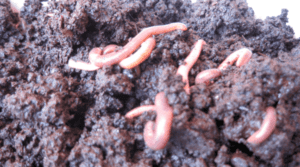 Earthworms are an important part of the soil ecosystem and yet these lowly creatures don’t receive the credit they deserve.
Earthworms are an important part of the soil ecosystem and yet these lowly creatures don’t receive the credit they deserve.
This is according to Karen Heron, avid earthworm farmer and founder of Earth Probiotic. Heron says she is constantly in awe of the benefits these creatures bestow on soil, essentially converting organic waste into nutritious compost.
“Castings (earthworm poop) from earthworms are recognised as an organic fertiliser that is packed with nutrients and minerals such as concentrated nitrates, potassium, magnesium, calcium, and phosphorus,” she explains.
Heron notes that worm castings increase a plant’s yield, protect both soil and plants from diseases, and help the soil retain moisture. “Hence castings are a safer and healthier alternative fertiliser to chemical-based products for supplementing your garden soil and plant,” she says.
Worm castings provide a range of benefits including increasing water holding capacity in soil, improving aeration, organic matter and soil structure, enriching soil with micro-organisms and disease suppressing among other things.
Protecting your garden
Vermicompost is typically composed of water-soluble plant nutrients, good bacteria, enzymes and organic scraps.
With all these organic elements this compost helps increase the soils capacity to retain water and nutrients due to the worm’s mucus and mineral clusters that the worms leave behind, also known as aggregates, according to Heron. The soil is also kept healthy as earthworm compost hosts more healthy microbes into the system.
The compost keeps the soil pure by removing damaging organisms such as fungus and bacteria. “Like the classic movie line “if you build it, they will come”, the moist environment from having vermicompost in your garden will attract even more worms. The more worms in your garden, the more fertile it will be,” Heron explains.
When soil is healthy, your plants will be able to gain more from it and the soil will be able to provide what the plants need.
 Earthworms are an important part of the soil ecosystem and yet these lowly creatures don’t receive the credit they deserve.
Earthworms are an important part of the soil ecosystem and yet these lowly creatures don’t receive the credit they deserve. Earthworms are an important part of the soil ecosystem and yet these lowly creatures don’t receive the credit they deserve.
Earthworms are an important part of the soil ecosystem and yet these lowly creatures don’t receive the credit they deserve.